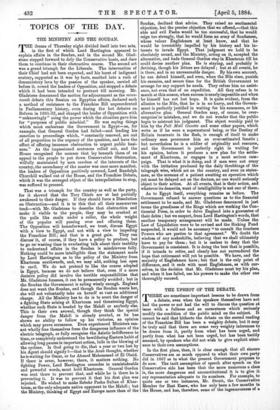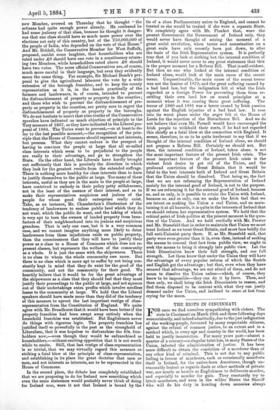THE UPSHOT OF THE DEBATE.
THERE are sometimes important lessons to be drawn front a debate, even when the speakers themselves have not had the power or not had the will to discuss the question at issue with a fullness and an earnestness which seriously modify the condition of the public mind on the subject. It cannot be said that hitherto the debate on the second reading of the Franchise Bill has been a weighty debate, but it may- be truly said that there are some very weighty inferences to be drawn from it, partly from what has been urged, and partly from what has not been urged, but has been tacitly assumed, by speakers who did not wish to give explicit utter- ance to their own assumptions.
In the first place, then, it is clear enough that all sincere Conservatives are as much opposed to what their own party did in 1867 as to what the present Government proposes to do now. The tacit assumption of speech after speech on the Conservative side has been that the more numerous a class is, the more dangerous and unconstitutional it is to give it any representation adequate to its numbers. For example, to quote one or two instances, Mr. Strutt, the Conservative Member for East Essex, who has only been a few months in the House, and has, therefore, some of the ingenuousness of a new Member, avowed on Thursday that he thought "the artisans had quite enough power already. He confessed he had some jealousy of that class, because he thought it danger- ous that one class should have so much more power over the elections not only of this country, but of the 250,000,000 of the people of India, who depended on the vote of that House." And Mr. Biddell, the Conservative Member for West Suffolk, proposed, amidst some laughter, that householders who are rated under £8 should have one vote in a constituency return- ing two Members, while householders rated above .28 should have two votes. The more official Conservatives are, of course, much more careful in their language, but even they evidently mean the same thing. For example, Sir Michael Beach's pro- posal to give the agricultural labourer the vote by a wide extension of the borough franchise, and to keep the county representation as it is, in the hands practically of the farmers and landowners, is, of course, intended to prevent the disfranchisement of property as property in the counties ; and those who wish to prevent the disfranchisement of pro- perty as property in the counties, are pretty sure to regret the disfranchisement of property as property in the boroughs. We do not hesitate to assert that nine-tenths of the Conservative speeches have indicated as much objection of principle to the Tory measure of 1867, as they have indicated to the Liberal pro- posal of 1884. The Tories want to prevent,—or at least to de- lay to the last possible moment,—the recognition of the prin- ciple that the House of Commons should represent not interests, but persons. What they cannot endure is the prospect of having to convince the people at large that all so-called class interests which seem to be prejudicial to the people are really to their advantage, and go to strengthen the State. On the other hand, the Liberals have hardly brought out sufficiently that this is precisely the direction in which they look for the greatest results from the extended suffrage. There is nothing more healthy for class interests than to have to justify themselves to the public at large. Too many of these interests, useful as they are in the main to the people at large, have contrived to embody in their policy petty selfishnesses, not in the least of the essence of their interest, and so to make their representatives suspicious and jealous of the people for whose good their enterprises really exist. Take, as an instance, Mr. Chamberlain's illustration of the tendency of landowners to enclose public land which they do not want, which the public do want, and the taking of which is very apt to turn the owners of landed property from bene- factors of their neighbourhood into its jealous and suspicious grandees. That is only one case, but it is a very common case, and we cannot imagine anything more likely to deter landowners from these injudicious raids on public property, than the consciousness that they will have to justify their power as a class to a House of Commons which does not re- present classes, but represents the welfare of the community as a whole. It is just the same with the shipowners. There is no class to whom the whole community owe more. But there is no class which is more apt to suffer by not being con- stantly kept in mind that they do exist for the good of the community, and not the community for their good. We heartily believe that it would be for the great advantage of the shipowners as a class that they should feel that they must justify their proceedings to the public at large, and not squeeze out of their undertakings extra profits which involve needless losses to the community at large. We hold that the Liberal speakers should have made more than they did of the tendency of this measure to uproot the last important vestige of class- representation from the Constitution of England. We quite agree with Mr. Broadhurst that it would have been better if the property franchise had been swept away entirely when the household franchise was established. But Englishmen never do things with rigorous logic. The property franchise has justified itself so powerfully in the past as the stronghold of Liberalism, that it was hopeless to disfranchise the 40s. free- holders now,—even though they would be enfranchised as householders,—without exciting opposition that it is not worth while to excite. Still, that last vestige of class-representation is so trivial, that we may virtually regard this measure as striking a fatal blow at the principle of class-representation, and establishing in its place the great doctrine that men as men, and not interests as interests, are to be represented in the House of Commons.
In the second place, the debate has completely established that we are proposing to do for Ireland now something which even the same statesmen would probably never think of doing for Ireland now, were it not that Ireland is bound by the tie of a close Parliamentary union to England, and cannot be treated as she would be treated if she were a separate State. We completely agree with Mr. Plunket that, were the present Government the Government of Ireland only, they would never have thought of seizing the moment of a great social revolution, when terror and assassination on a great scale have only recently been put down, to alter the basis of the Irish Representative system. It is perfectly true that if you look at nothing but the internal condition of Ireland, it would never occur to any great statesman that this is the proper moment for a Reform Bill. That is self-evident. But then no one who looked at the internal condition of Ireland alone, would look at the main cause of the recent terror. Unquestionably, the main cause of the recent terror was not the famine of 1879, and the great suffering caused by a bad land law, but the indignation felt at what the Irish regarded as a foreign Power for preventing them from re- settling their own land law on sound principles at a moment when it was causing them great suffering. The terror of 1880 and 1881 was a terror caused by Irish passion against the English injustice of a bad land law. It rose into its worst phase under the anger felt at the House of Lords for the rejection of the Disturbance Bill. And we do not believe that even Mr. Parnell would have encouraged the Irish people to withhold their rents, if he had not regarded this chiefly as a fatal blow at the connection with England. It seems, therefore, to us to be quite irrelevant to say that if we thought of the internal condition of Ireland alone, we should not propose a Reform Bill. Certainly we should not. But then, the internal condition of Ireland, taken alone, is not the most important feature of the present Irish crisis. The most important feature of the present Irish crisis is the violent Irish desire to get rid of the Union, and the profound conviction of Great Britain that it would be fatal to the best interests both of Ireland and Great Britain that the Union should be dissolved. That being so, the fact that we are not reforming the Representation of Ireland mainly for the internal good of Ireland, is not to the purpose. If we are reforming it for the external good of Ireland, because so, and so only, is it possible to retain the Union with Ireland, because so, and so only, can we make the Irish feel that we are intent on making the Union a real Union, and on main- taining it at all hazards, it is quite in the interests of Ireland that we should reform her representative system. We hold that the critical point of Irish politics at the present moment is the ques- tion of the Union. And we hold cordially with Mr. Forster and Mr. Stansfeld that in order to maintain that Union we must treat Ireland as we treat Great Britain, and must face boldly the full anti-Unionist party there. If, as Mr. Stansfeld said, that party were even greater than it is, even then, instead of seeking the means to conceal that fact from public view, we ought to seek the means to bring it strongly into public view. Let the Irish Disunionists know their full strength, and our full strength. Let them know that under the Union they will have the advantage of every popular reform of which the Scotch and English get the advantage ; but that, even when they have secured that advantage, we are not afraid of them, and do not mean to dissolve the Union unless—which, of course, they know to be impossible—they can do it by force. Then, and then only, we shall bring the Irish Disunionists to reason, and find them disposed to be content with what they can justly demand under the Union, and inclined to cease at last from crying for the moon.















































 Previous page
Previous page